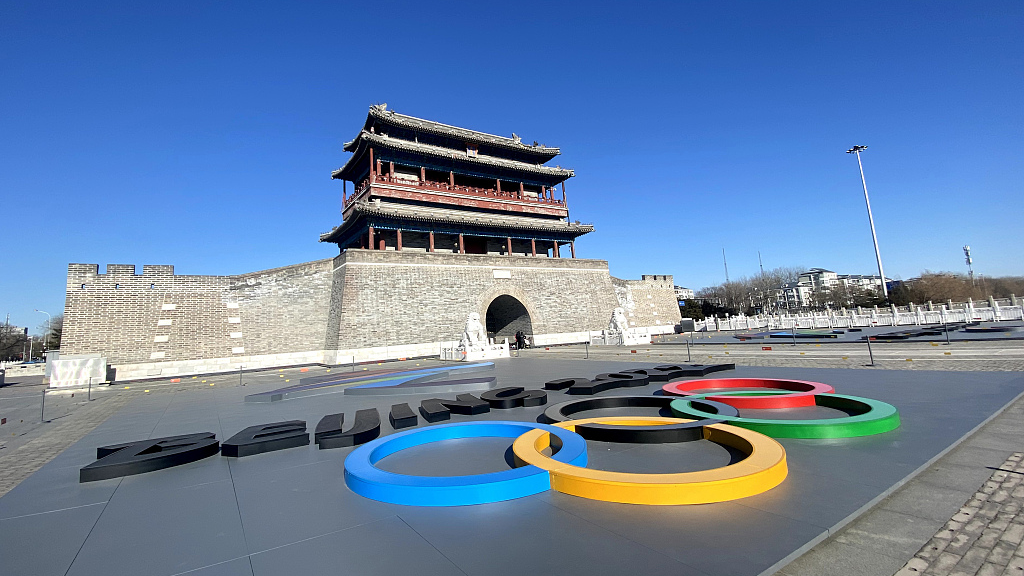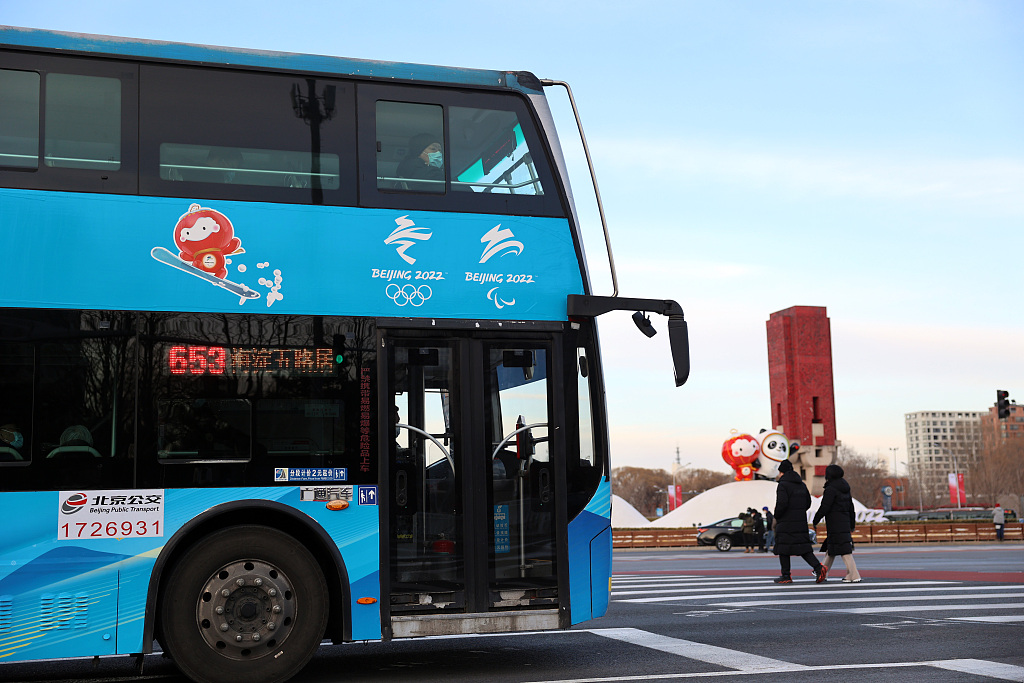
The emblem of the Beijing 2022 Winter Olympic and Paralympic Winter Games is displayed at Yongdingmen Square in Beijing, capital of China, January 17, 2022. /CFP
The emblem of the Beijing 2022 Winter Olympic and Paralympic Winter Games is displayed at Yongdingmen Square in Beijing, capital of China, January 17, 2022. /CFP
Editor's note: Stephen Ndegwa is a Nairobi-based communication expert, lecturer-scholar at the United States International University-Africa, author and international affairs columnist. The article reflects the author's opinions and not necessarily the views of CGTN.
As if the U.S. official boycott of the forthcoming Beijing Winter Olympics was not malicious enough, the country's diplomatic mission in China is envisioning a new stratagem aimed at undermining the international games in February. According to U.S. media reports, the country's diplomatic mission has requested the State Department to grant them "authorized departure" to leave the country due to strict COVID-19 containment measures.The story published on CNN on January 26, quoting undisclosed diplomatic sources in both Washington and Beijing, revealed that the U.S. diplomatic staff felt overwhelmed by the strict measures against the pandemic and asked for a temporary reprieve until the situation eases.
The story published on CNN on January 26 quoting undisclosed diplomatic sources in both Washington and Beijing revealed that the U.S. diplomatic staff felt overwhelmed by the strict measures against the pandemic and were asking for temporary reprieve until such a time that the situation eases.
Of course, this is an insult to the host country, who have done what it takes to curb the spread of the deadly coronavirus both internally and out of its borders. Furthermore, the new intention downplays the role China has played overseas in the fight against the pandemic, particularly donations of billions of vaccines, knowledge sharing and donations of medical and health necessities particularly to developing countries.
In a different development, Beijing has stated that it does not need validation for its COVID-19 strategy, especially after the International Monetary Fund (IMF) recently warned that China's aggressive anti-pandemic strategy has spurred a slowdown of its economy. In its alert, the IMF also warned that the country's zero-COVID strategy would hurt global supply chains and economic growth.
China's response through its Foreign Ministry spokesperson Zhao Lijian clarified the misperception, stating that "China has always adopted scientific, comprehensive and effective prevention and control measures." Contrary to the creation of an erroneous perception of vulnerability by the above instances, the country remains pivotal to global economic growth, while its economy continues to strengthen its resilience.

A bus in Beijing covered with Winter Olympics elements, January 26, 2022. /CFP
A bus in Beijing covered with Winter Olympics elements, January 26, 2022. /CFP
Indeed, it is these measures that have sustained the global supply chains so far and made the country the only major economy to record positive growth in 2020 when the pandemic was at its apex and the world was at a standstill, literally speaking. We need to ask where the bulk of anti-pandemic supplies would have come from if COVID-19 had brought the world's factory to its knees.
It is okay for foreigners to feel inconvenienced out of home for whatever reason. Unfortunately, the impression given is that China is a country under siege, and there is a need to plan for an evacuation. The aim is to alienate its allies' diplomats further as the Winter Olympics near.
Now, the diplomatic request by U.S. staff in China appears like a well-choreographed escalation of the former's cynical diplomatic boycott of the Beijing Olympics. The Winter Games are definitely another feather in the cap of China's geopolitical credentials, something that makes the U.S. green with envy. It is aimed at denying the second-largest economy the credit that it well deserves.
In a meeting on January 25 with Chinese President Xi Jinping in Beijing, the International Olympic Committee President, Thomas Bach, said, "China is now a winter sports country, and this is the start of a new era for global winter sports." This unequivocal statement was a seal of approval from the highest sports body in the world. It cannot go further than that; neither does it need the endorsement of naysayers who have vested interests in the decisions they make.
If the U.S. planned to create some sort of mass hysteria in the diplomatic community domiciled in China, then the move has flopped. Apart from a few of the usual suspects under the U.S.' beck and call, the sporting world as a whole can't wait for the games to begin. Indeed, athletes are usually some of the best diplomats for countries.
At least, the U.S. should respect the painstaking work that has gone into making the games a success since Beijing won the bid to co-host the games with Zhangjiakou city in 2015. The impact is huge. China has constructed 654 standard ice rinks, while indoor and outdoor ski resorts have grown to 803, up from 568.
According to data released by China's National Bureau of Statistics on January 26, the development has inspired more than 346 million Chinese to participate in winter sports, with the youth aged 18 to 30 years forming the biggest percentage of this number at 37 percent. The games have also been a boon for winter sports tourism in China, with 305 million winter sports-related trips expected in the current winter season, up from 254 million in 2021.
Well, by all means, the Beijing Winter Olympics will go on. Those who have decided to stay away from the historical moment will soon rue the folly and futility of their ways.
(If you want to contribute and have specific expertise, please contact us at opinions@cgtn.com.)

